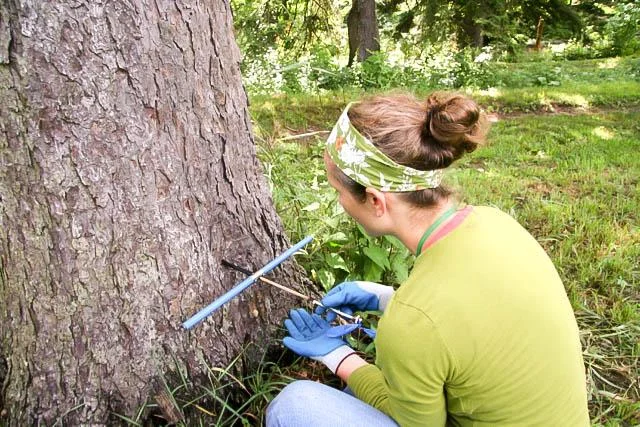A new ecologist and statistical expert has joined our team to help us solve our biggest conservation challenges. Welcome Ailene Ettinger! As Quantitative Ecologist, Ailene develops the evidence base for The Nature Conservancy’s efforts to protect and restore lands in Washington. Ailene earned a Ph.D. in Biology from the University of Washington, focusing on community ecology, climate change, and urban ecology. Whether at work or at play, she loves being outdoors in Washington’s forests, mountains, and seas! Hiking, skiing, camping, and cooking with her family and friends are some of her favorite ways to spend time.
We sat down with Ailene to learn more about her background and scientific adventures:
What is your earliest nature memory?
My earliest nature memories are exploring the forests and fields in Maine, where I grew up. Some of my most treasured nature memories are from an unexotic field behind my house, where my best friend and I would play for hours in “the pit.” The pit was simply a large hole in the ground, about three or four feet in diameter and a few feet deep, originally created, I think, when my dad thought it would be fun to try to drive our old jeep through the field and it got stuck, sinking into the dirt. We could crouch down in the pit and be completely hidden from view to anyone nearby. It became our secret, special place where we caught fireflies, built fairy houses, made weavings from the tall grass surrounding it, searched for dinosaur bones and archeological relicts, and experienced countless other adventures.
If you could interview one expert in your field, who would it be and why?
I would love to interview Rachel Carson, who I admire for her science, writing, and advocacy. She showed tremendous courage in her approach to shedding light on environmental problems, and seemed to keep her sense of hope and communicate eloquently her sense of wonder throughout her work. I think she could share helpful insights about today’s environmental challenges, and I would love to celebrate the come-back of bald eagles with her.
Describe one of your favorite field experiences.
One of my favorite field experiences was studying wild bees in a coffee-growing region of Costa Rica. We were trying to understand how coffee farms affect wild bee diversity and our work involved driving around small and large farms, watching and identifying bees. At one site we always saw white-faced capuchin monkeys; we also encountered a huge boa constrictor crossing the road, and I nearly stepped on a highly venomous fer-de-lance snake! We met amazing people through this work, as well- one of the farmers who allowed us to conduct research on his land turned out to be a bee-lover who kept hives of native Costa Rican stingless bees that produce honey.
What is it about The Nature Conservancy that causes you to devote your professional energy to the cause?
There are many reasons why I’m thrilled to be working at The Nature Conservancy; I still feel a bit star-struck, to tell you the truth, as The Nature Conservancy has long been a conservation organization that I deeply admire. One reason why I believe this organization's work is so powerful and important is that it is well-positioned to work at the nexus of science and conservation, in service of people and nature. Too often science and conservation exist as silos with insufficient communication between them, and too often we are led to believe that there is a dichotomy between what’s good for people and what’s good for nature. I love that the Conservancy's vision is thriving nature and thriving communities.


















